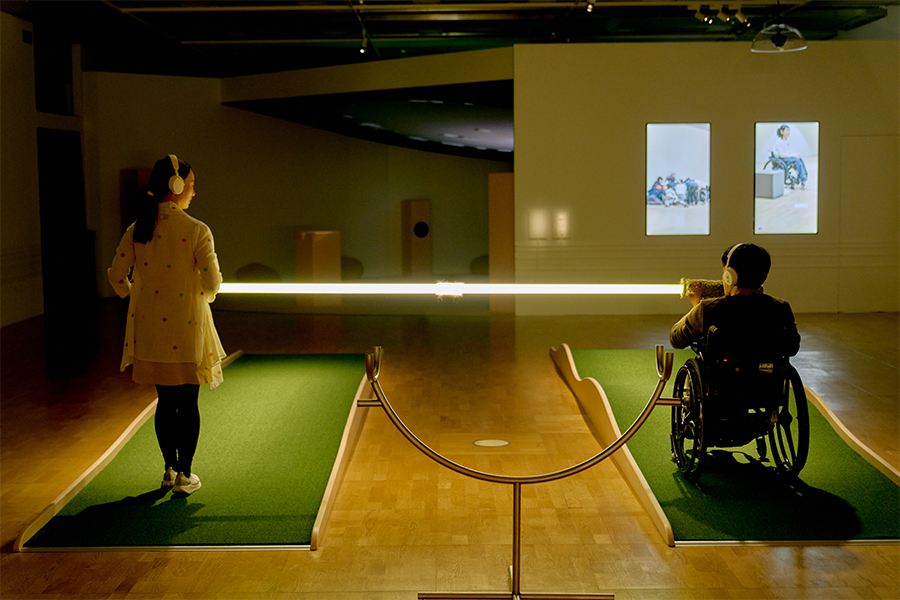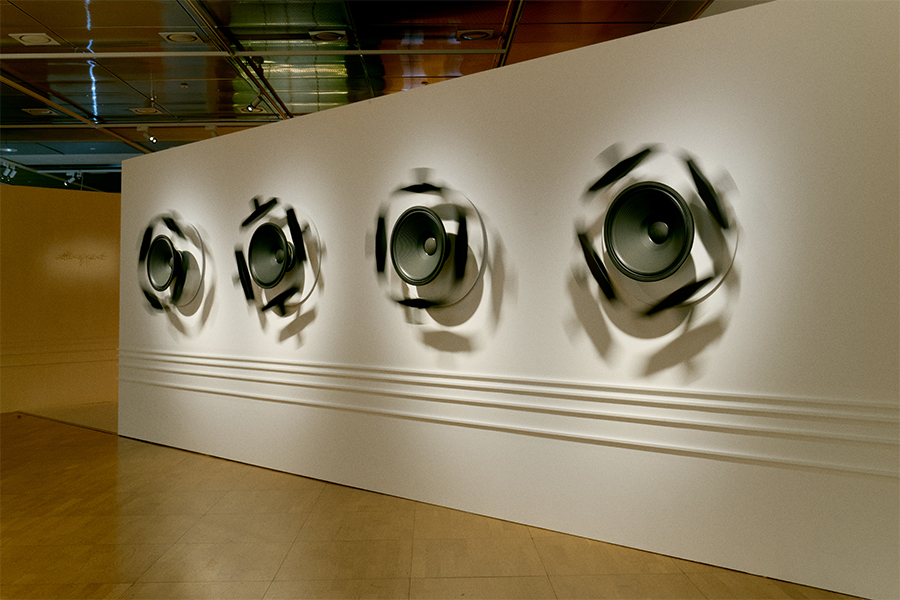 SONG Yeseul, Balancing Act, 2025,
Interactive installation, Dimensions variable. Commissioned by the National
Asian Culture Center. Courtesy of the artist. ©National Asian Culture Center,
filmed by Sunho Park Studio (Park Sunho, Son Hyeonwook, Park Danbi)
SONG Yeseul, Balancing Act, 2025,
Interactive installation, Dimensions variable. Commissioned by the National
Asian Culture Center. Courtesy of the artist. ©National Asian Culture Center,
filmed by Sunho Park Studio (Park Sunho, Son Hyeonwook, Park Danbi)The National Asian Culture Center (ACC) is
hosting the 2025 ACC CONTACT exhibition 《Crossing the
Line: Our Bodies, Embedded with Others》 through June
29, as part of its efforts to ensure that both disabled and non-disabled
individuals can enjoy and participate in cultural and artistic experiences.
Marking its 10th anniversary, ACC has
organized this exhibition in collaboration with the Korea Disability Arts &
Culture Center, reinforcing its commitment to being an "open cultural
institution for all." Notably, this exhibition is especially meaningful as
it presents "barrier-free" not merely as an assistive tool or device,
but as an artistic genre in itself.
 OUM Jeongsoon, Elephant Without Trunk no.2,
2024-2025, Installation; high-density styrofoam, recycled plastic flake, metal,
230(h)X150(W)280(D)cm. Commissioned by the National Asian Culture Center.
Courtesy of the artist. ©National Asian Culture Center, filmed by Sunho Park
Studio (Park Sunho, Son Hyeonwook, Park Danbi)
OUM Jeongsoon, Elephant Without Trunk no.2,
2024-2025, Installation; high-density styrofoam, recycled plastic flake, metal,
230(h)X150(W)280(D)cm. Commissioned by the National Asian Culture Center.
Courtesy of the artist. ©National Asian Culture Center, filmed by Sunho Park
Studio (Park Sunho, Son Hyeonwook, Park Danbi)Korean society strongly tends to perceive
disability from a medical perspective, categorizing bodies without disabilities
as “normal” and those with disabilities as “abnormal.” This exhibition, on the
other hand, refuses to discuss disability in terms of “impairment” as in
medicine, adopting a sociological perspective instead to focus on the social
exclusion experienced by those with disabilities. This perspective sees people
with disabilities not as peculiar but as “individuals” and “meaningful others”
who are related to other members of society.
The exhibition features five Korean and
overseas artists (individual and group) who have pursued barrier-free,
disability, Participatory Art, and interactive art in an attempt to “cross the
line” through art. This exhibition, which proposes a new attitude with which to
perceive disability and art as a boundary-transcending practice, is more than
an attempt to promote consideration of people with disabilities and a step
toward improving accessibility for everyone.
 Rémi KLEMENSIEWICZ, Orbit (Tautophonology #4),
2025, Sound installation; speakers, motors, sound, Dimensions variable. Commissioned
by the National Asian Culture Center. Courtesy of the artist. ©National Asian
Culture Center, filmed by Sunho Park Studio (Park Sunho, Son Hyeonwook, Park
Danbi)
Rémi KLEMENSIEWICZ, Orbit (Tautophonology #4),
2025, Sound installation; speakers, motors, sound, Dimensions variable. Commissioned
by the National Asian Culture Center. Courtesy of the artist. ©National Asian
Culture Center, filmed by Sunho Park Studio (Park Sunho, Son Hyeonwook, Park
Danbi)This exhibition is notable not only for its
artworks but also for its enhanced accessibility in spatial design,
programming, and staffing. To accommodate children and visitors with visual
impairments, tactile guide bars are installed along the gallery walls to
indicate the exhibition route, and sensory tiles representing various sensory
organs are provided to facilitate engagement with the artworks.
Additional accessible features include a
tactile map for previewing the exhibition space, promotional materials in the
form of storybooks for easier understanding, braille books, a game-based audio
guide, permanent educational kits for children, and simplified audio
descriptions. An on-site accessibility manager is also present at all times to
assist visitors and support their understanding of the exhibition.
Furthermore, ACC will enter into an
agreement on May 17 with the Korea Disability Arts & Culture Center to
enhance accessibility in exhibitions and performance content. This exhibition
marks the beginning of that collaboration. After its run at ACC until June 29,
the exhibition will travel to Seoul, where it will be shown at Modu Art
Space—Korea’s first standardized exhibition venue for artists with
disabilities—from July 23 to August 22.
Participating
Artists: KIM
Wonyoung·SON Naye·YEO Hyejin·LEE Jeeyang·HA Eunbeen, SONG Yeseul, Aya MOMOSE,
OUM Jeongsoon, Rémi KLEMENSIEWICZ
































